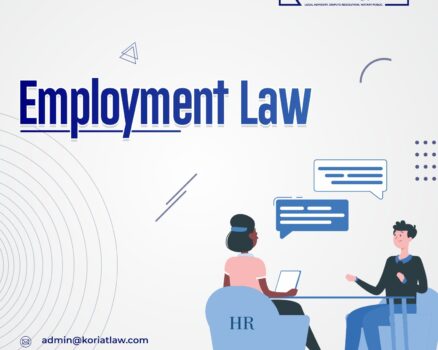
- What is the Meaning of Indefinite Suspension?
Suspension is the placement of an employee in an involuntary, paid or unpaid status for a temporary indeterminate period of time pending investigation, inquiry, or further management action. Suspension is the temporal withdrawal from employment, as distinguished from permanent severance. The Supreme Court in University of Calabar v Esiaga (1997) 4 NWLR (Pt. 528) 719 SC, stated that: “the word suspension means a temporary privation or deprivation, stoppage or cessation of or from the right or privileges of a person. The word carries or conveys a temporary or transient disciplinary procedure which keeps away the victim or person disciplined from his regular occupation or calling either for a fixed or terminal period or indefinitely.”
From the above definition, it can be inferred that indefinite suspension of an employee is simply a stoppage of the rights and obligations under a contract of employment for an indefinite or indeterminate period of time. Indefinite suspension means that the employer has not clearly indicated the resumption date for a suspended employee.
Thus, whether a suspended employee is still, for all purposes and intents, an employee of his employer while on indefinite suspension is a question of facts or mixed facts and law. A critical review of the power to suspend indefinitely (as set out in the contract document) and the procedure adopted for suspending an employee indefinitely will assist an employment litigation lawyer in reaching the right conclusion.
- What are the Legal Effects of Indefinite Suspension?
The following are some of the legal effects of indefinite suspension:
Temporary Suspension of Contract of Employment:
The first and most important effect of the suspension of an employee is the temporary suspension of the contract of employment and all the duties and rights in the contract. This means that the contract of employment entered into by the parties to the contract of employment has been put in abeyance pending the final decision of the employer whether to reinstate the employee back to the employment, or to summarily dismiss him or to terminate the contract by any means stated in the contract of employment. The Supreme Court corroborating the above submission in Longe v FBN Plc (2010) 6 NWLR (Pt. 1189) 1, held that: “Suspension is a state of affairs which exists while there’s a contract in force between the employer and the employee, but there’s neither work being done in pursuance of it nor remuneration paid. It is neither the termination of the contract nor the dismissal of the employee. It operates to suspend the contract rather than terminate it.”
Abeyance of the Duty to Work by the Employee and the Duty to Pay by the Employer:
Suspension puts in abeyance the duty to work by the employee and also the duty to pay by the employer. However, it must be noted that the right to suspend an employee does not extinguish the employer’s obligation not to pay salary to the suspended employee unless otherwise agreed. In other words, the power of an employer to suspend an employee without pay or half pay must be expressly contained in the employment contract.
The Court of Appeal in the case of Globe Motors Holding Ltd v Akinyemi Adegoke Oyewole (2022) JELR 109330, following the precedent set by the supreme court in Longe v FBN Plc (supra) and also applied by the supreme court in the subsequent case of Bamisile v NJC & Ors. (infra) held thus: “since the suspension is not a termination of the employment contract nor a dismissal of the employee, the implication is that the employee is still in continuous employment of the employer until he is recalled or formally terminated or dismissed. Pending his recall or dismissal, a suspended employee is entitled to his wages or salary during the period of suspension unless the terms of the contract of employment or the letter of the suspension itself are specific that the suspended employer will not be paid salary during the period of the suspension.”
In practice, employers usually pay or are expected to pay a suspended employee after his recall back to work.
- Do employers have power to suspend employees?
Questions often arise as to whether the employer has the right to suspend an employee and the answer to the above question is in the affirmative. Every employer has unquestionable power to suspend his or its employee whether or not such power is written expressly in the employment contract. The court in Miaphen v Unijos Consultancy Ltd (2013) LCN 6210 CA, held thus: “…An employer has the right to suspend any of his or its staff if there exist reasonable grounds to do so.”
The court also expressed a similar view in Udemah v Nigerian Coal Corporation (1991) 3 NWLR (Pt. 180) 479 at 486. In that case, the court held that: “The right to suspend an employee is available to an employer to effect proper investigation of allegations and during the process of disciplinary action.”
- Must the Employer Give Reasons for the Suspension of an Employee?
Generally, the employer does NOT have an obligation to give reason for suspension. But for good practice, an employee ought to know the reasons for his suspension, and what allegations are against him. Where the suspension is indefinite and without pay or denial of half of wages, or other benefits, then the employee ought to be afforded an opportunity to defend himself against the allegation before the suspension.
- Must an employee be given a fair hearing before suspension?
NO. Employees do not, in all cases, deserve to be given a fair hearing before their suspension. The reason being the urgency of the situation, in most instances, demands that the management of a business must act swiftly to remove an indicted employee immediately pending further investigation to avoid further damage(s) from being done to the employer’s business. Also, the fact that an indicted employee, most times, may interfere with the investigation of the alleged misconduct committed by him/her unless immediately suspended is another reason for excusing the employer for not giving fair hearing before suspending a worker. In the case of Longe v FBN Plc (supra), the court stated that:
“I want to ask myself whether he ought to have been heard before his suspension. The appellant was suspended and eventually removed because it became necessary to do so in the interest of the respondent’s business. It is a desperate situation that demands drastic action. It cannot wait for legal finesse such as fair hearing or natural justice. That can wait! The interest of the respondent’s business is of paramount consideration and the appellant will not be entitled to fair hearing before a suspension.”
- Can an Employee be Suspended Indefinitely without Pay?
The answer will depend on the contract of the parties. Suspension from work without pay (unpaid suspension) is a disciplinary measure taken by employers typically for employee misconduct, such as theft, unsafe work behavior, or company policy violations. Employers are generally well within their legal right to use this form of discipline to recover any loss attributed to the indicted worker. In Atoki v. Ecobank Nig. Ltd. (2014) 47 N.L.L.R. (Pt. 151) 33, the NICN remarked that: “An employer has the right to suspend an employee whenever necessary with or without pay. However, employers cannot suspend without pay where there is no express or contractual right to do so.”
It is also important that the employer, who uses this form of disciplinary procedure, has some sort of an employee handbook or policies and procedures manual, which spells out the employer’s discipline policy and specifies suspension without pay as a remedy within that policy. Thus, in the case of Globe Motors Holding Ltd v Akinyemi Adegoke Oyewole (supra) the court held as follows: “Since suspension is not a termination of the employment contract nor a dismissal of the employee, the implication is that the employee is still in continuous employment of the employer until he is recalled or formally terminated or dismissed. Pending his recall or dismissal, a suspended employee is entitled to his wages or salary during the period of suspension, unless the terms of the contract of employment or the letter of suspension itself is specific that the suspended employer will not be paid salaries during the period of suspension.”
The rationale for this is that, in suspending an employee without pay, the employer has taken it upon itself (outside of the court) to assess its own damages for the employee’s misconduct at the sum which would be represented by the wages of the day the employee remains suspended. The same conclusion was reached in Shell Development Company (Nig.) Ltd. v. Omu (1998) 9 NWLR (Pt. 567) 672. Because of the widespread adoption of the doctrine of employment at will, it is usually difficult, if not impossible, for an employee to successfully challenge an unpaid suspension. However, where suspension without was actually imposed as a form of discrimination, rather than discipline for misconduct, then, such an act will be unlawful for being an unfair labour practice.
- What is the legal status of a suspended employee?
The legal status of an employee on suspension is that he remains an employee of the suspending employer. This position was buttressed by the National Industrial Court of Nigeria in Duru v. Skye Bank Plc (2015) 59 NLLR (Pt. 207) 680 at P. 731, Paras. E-B, when it held that: “During the period of suspension of an employee, the employment is neither terminated nor dismissed. Rather, it is merely put on hold to enable the employer properly carry out its investigations on its allegations against the employee. For the period of the employee’s indefinite suspension without pay, he is still in the employ of the employer and so is entitled to his salaries and allowances.”
The above position is in accordance with the decisions of the Court of Appeal in Federal Airport Authority of Nigeria v. Greenstone Ltd (2009) All FWLR (Pt. 711) 755 and Joseph v. Kwara State Polytechnic (2014) All FWLR (Pt. 750) 1215.
However, notwithstanding the above, the line of judicial decisions suggest that a suspended employee can only sue for damages and not reinstatement to the employment. According to the courts, an employer who suspends indefinitely without pay and refuses to recall an employee has repudiated the employment contract. See the case of Bamisile v. National Judicial Council [2013] All FWLR (pt. 678) 911
In Ilodibia v. Nigerian Cement Coy (1997) 53 LRCN 2507, where an employee who was placed on indefinite suspension on half-pay after a protracted period brought an action for recall and still entitled to his salary and other entitlements notwithstanding the suspension. The Court of Appeal held that: “By failing, refusing and or neglecting to recall the employee, the defendant had repudiated the contract of employment and the employees’ claim is tantamount to a claim for reinstatement which is only available to an employee whose employment is statutorily flavoured.” Consequently, the claim was refused.
In Ekpeogu v. Ashaka Cement Coy (1997) 6 NWLR (pt. 508) 280. The Appellant was suspended indefinitely without pay on allegation of stealing the Respondent’s property and charged to court, he was subsequently discharged and acquitted and he brought an action for his recall which was not granted. On appeal though the Court of Appeal acknowledged the fact that he ought to a have been recalled after his acquittal as the notice of suspension cannot metamorphosis into a notice of termination, nevertheless the Court of Appeal held that: “The matter boils down to this, namely, that even though the suspension notice could not take the position of one month’s notice or one month’s salary in lieu of notice, the fact remains the same, that is to say the employment was effectively terminated. There is nothing one can do. The common law view is that in the ordinary case of master and servant … if the master wrongfully terminates the servant (or even wrongfully dismisses him) either summarily or by giving insufficient notice, the employment is effectively terminated, albeit in breach of contract.”
From the above, it would appear that by holding that repudiation amounts to termination the courts have technically converted suspension to termination despite the age-long principle of law that a suspended employee remains an employee until terminated. This position works injustice to the employee who cannot get reinstatement (unless the employment is protected by a statute) and leads to greater injustice in the award of damages as some courts awarded, as damages, the amount the employee would have got if he had been properly disengaged.
It must, however, be mentioned that the current trends of judicial decisions from the National Industrial Courts tend to regard indefinite suspension without pay as unfair labour practice which must be discouraged and in awarding damages to a suspended staff, the courts tend to regard the date of judgment as the date of termination of the employment.
- Can the Court Order the Reinstatement of a Wrongfully Suspended Employee?
The answer to the above question is yes. The Supreme court in Gov. Of Kwara State v Ojibara (2006) 18 NWLR (Pt. 1012) 645, stated that: “Reinstatement involves putting the specified person back in law and fact in the same position as he occupied in the undertaking before the employer terminated his employment.”
The court can order the reinstatement of a wrongfully suspended employee but for this to be the case, it must be a contract of employment with statutory flavour. The court in Odibo vs First Bank Plc (2018) LCN 12072 CA, stated thus: “In law, employment Founded on a master-servant relationship for personal service without any statutory flavour does not enjoy the relief of reinstatement. The courts are thus very reluctant and lack the competence to force a willing servant upon an unwillingly master in a contract of employment of personal service”.
It is apparent from all the case law authorities on suspension that an employee suspended with or without pay, and whether indefinitely or for a period of time, remains an employee in service. However, the Court in OLAFIMIHAN & ILODOBIA V NIGERIAN CEMENT CO.[1997] 53 LRCN, 2507 and Prof Chioma Agomo in her book, Nigerian Employment and Labour Relations Law and Practice (Concept Publication Ltd: Lagos), 2011 at Page 163 to 166 held the view that an indefinite suspension may evince the intention of the employer to repudiate the contract of employment. Nevertheless, our courts are enjoined to consider the length of years the employee has been on suspension, the worker should be awarded the backlog of his salary and allowances together with all other entitlements that go with repudiation of his employment, less whatever indebtedness the employee may have to the employer.
Please note that the National Industrial Courts have recently ordered reinstatement in employment cases between banks and their workers. See, for example, Ibrahim Bello v. Eco Bank Plc.




